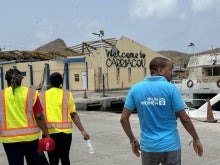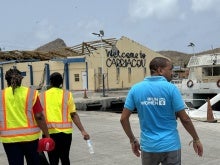When Hurricane Beryl tore through the Caribbean in early summer, it left a trail of destroyed homes, unpassable roads, and ruined local infrastructure. As climate change raises global temperatures, hurricanes will likely become more intense in the region, as storms feed on warm waters at the ocean surface.
As nations begin to rebuild after Beryl and brace themselves for even more storms, UN Women has been on the ground and working to ensure that women are fully integrated into recovery efforts.
“I know we are strong and resilient people, very independent-minded, and I know in times of trouble, that is when we are most strong,” said Marslyn Lewis, the owner of Marslyn’s All-Natural Sea Moss Solutions, a local business in St. Vincent and the Grenadines that produces sea moss-based health and cosmetic products.
Hurricane Beryl’s destruction of sea moss farms in the Grenadines has severely impacted Lewis’ business, leaving her with no product to sell and no hope of income for at least six months, until new sea moss seedlings can mature. UN Women worked with Lewis to buy the remainder of her stock, for inclusion in aid packages delivered to those in need.
UN Women’s response to Hurricane Beryl in Grenada, Carriacou, St. Vincent, and the Grenadine islands—Union Island and Bequia—includes providing psychosocial support to impacted people, injecting cash into the local economy to empower women, ensuring protection of women and girls in shelters, and distributing essential hygiene and dignity items for women and girls through aid packages.
“Relying first on local and women-owned businesses has been a key strategy of UN Women’s response to disasters,” said Tonni Brodber, Representative of UN Women’s Caribbean Multi-Country Office. “This helps reinvigorate local economies and directly supports small and medium enterprise owners as they restore their livelihoods.”
In Bequia, women lost businesses that were more than just jobs—they represented years’ worth of effort and sacrifice.
“Before the hurricane I was doing training in disaster management and resilience, and it still did not prepare me for Beryl,” said Ronita Ollivierre, owner of the local sea moss cultivator and supplier Ocean Remedies. “In a couple hours, wind just took the farm, the drying station, it is just gone. People might think it’s material things and you can get it back, but it took three years to get here, and how are you going to get it back?”
UN Women has been working closely with local authorities and community leaders to ensure that the Beryl response addresses the specific needs of women, who are often disproportionately affected by disasters. This approach stems from UN Women’s Build Back Equal (BBE) programme, funded by the government of Canada, which aims to not only restore what was lost but also to create more equitable and resilient communities in the process.
The BBE programme was implemented with the aim of contributing to women’s economic resilience in the Eastern Caribbean by taking a comprehensive approach to addressing the barriers that women face to economic empowerment and providing increased sustainable opportunities for women’s economic growth. With the impact of Beryl on many women-owned businesses, the programme aims to equip business owners with the skills and financing to grow their businesses through environmentally friendly and climate- and shock-resilient innovation.
As part of the BBE programme, UN Women is supporting the development of referral and coordination systems to address gender-based violence, and to ensure that they are maintained amid the crisis recovery efforts.
Nadina Williams, a government social worker on the island of Carriacou, worked closely with UN Women to provide relief, despite her own home being impacted by the hurricane. Williams and others engaged tirelessly to direct relief efforts and support shelters and childcare centres, ensuring that the needs of the most vulnerable were met.
“The impact of UN Women with regards to us here on the sister isle is the attention to detail, the quickness, and the urgency in terms of how the team has responded,” said Williams. She specially commended UN Women for its coordination of the local BBE programme in Grenada.
Williams, who is also a representative of the BBE National Project’s Steering Committee, noted that recipients were “really thrilled even to get the smallest thing, such as a bottle of lotion,” in aid packages. “I know our women felt valued,” she added.
UN Women’s efforts to understand and respond to the gendered impacts of disasters are part of a long-standing commitment to ensuring that no one is left behind in the recovery process. The recent Small Island Developing States (SIDS) conference and Gender Equality Forum underscored the vulnerability of island nations to climate change and disasters, and the need for targeted interventions that address these unique challenges.
In Beryl’s aftermath, the importance of this work has become even more evident, especially for entrepreneurs like Lewis, who attended the SIDS conference herself.
“Emotional support is very important at this point, because I have to be strong for not only myself but for my siblings and son,” Lewis said.
“We just need to be there for each other and support each other through this,” she added. “It is no longer ‘me and mine and yours.’”

